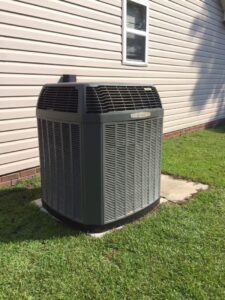 5 Ways to Extend the Lifespan of Your System
5 Ways to Extend the Lifespan of Your System
Here at O’Brien Service Company we know having a new heating and air system installed in your home can be a big stress. While we try and make the transition smooth for all of our customers, we also want to help you to extend the lifespan of your system that you currently have. There are several steps you can take to help extend your current systems lifespan. Though, keep in mind the average lifespan for most systems is only 10-15 years. After that their efficiency starts to drop. Therefore, may require costly repairs due to age. We’ll be more than happy when the time comes to assist you in choosing a new system. Until that time, here are 5 ways to help extend the lifespan of your system.
HVAC System Size
1- The first way to extend the lifespan of your system is to be sure when the system is installed that it is properly sized. To determine the size of the system a specialists will perform a load calculation. This is very important. Having an incorrect sized system will cause extra wear. A system that is too small for your home will run constantly trying to heat or cool your home. However, it won’t be able to keep you comfortable due to the improper size. A system that is too big will have to shut on and off constantly because it reaches the temperature too fast. This will cause moisture issues as well as wear on the system. Whether or not we install your next system, be sure that you have the correct sized system installed in your home in order to extend the lifespan of your system.
HVAC Maintenance
2- Having annual maintenance performed on your system is one of the most substantial ways to extend the lifespan of your system! Think about your car. You wouldn’t go years without changing the oil and having service. Well same with your heating and air system. This is something that runs almost 365 days of the year. Therefore you need to take care of it! During a maintenance inspection we’ll check your system for possible issues before they turn into major repairs. As well as have a thorough cleaning of parts that need it such as your coil. They’ll flush your drain line to get all the gunk out of it which prevents water leaks. Finally make sure that your system is running at its top efficiency. Trane states, “Asking a professional to check your system will increase the life of the system, improve energy efficiency, reduce pollutants and save money.” For more information on a maintenance plan (Energy Savings Club), contact our office.
Change Your Filters
3- A simple, but imperative step to extend the lifespan of your system is to change your filters! When your filters are dirty they clog making it harder for the air to pass through. This means that your system has to work harder to try and reach your set temperature. Energy.gov says that replacing a dirty filter with a clean one can lower your air conditioner’s energy consumption by 5-10%. If you are not sure when you are supposed to be changing your filters, here is an article that explains when to change the filter for your system.
Don’t Overwork It
4-Don’t overwork your system. What that simply means is be reasonable about the temperatures that you set your thermostat to. On a 100⁰ day, don’t set your thermostat to 68⁰. It will never reach that temperature. But, it will run all day trying. Another great way to ensure that your system gets rest is to have a programmable thermostat installed. By having one, when you are not home your system does not have to work as hard. Though, can be set to be your desired temperature for when you arrive home. This article on programmable thermostats will explain into more detail how it can help extend the lifespan of your system.
Assist your HVAC System
5- The final tip is to give your system a hand! There are many simple steps you can take to help extend the lifespan of your system. Steps such as closing your blinds during the summer to keep the sunlight out. Using your ceiling fans, and making sure your home is properly sealed and insulated. Also, clearing your outdoor system of sticks and debris. Additionally changing your filters, and making sure you have your annual inspection! For more tips like this check out our Energy Saving Tips.
